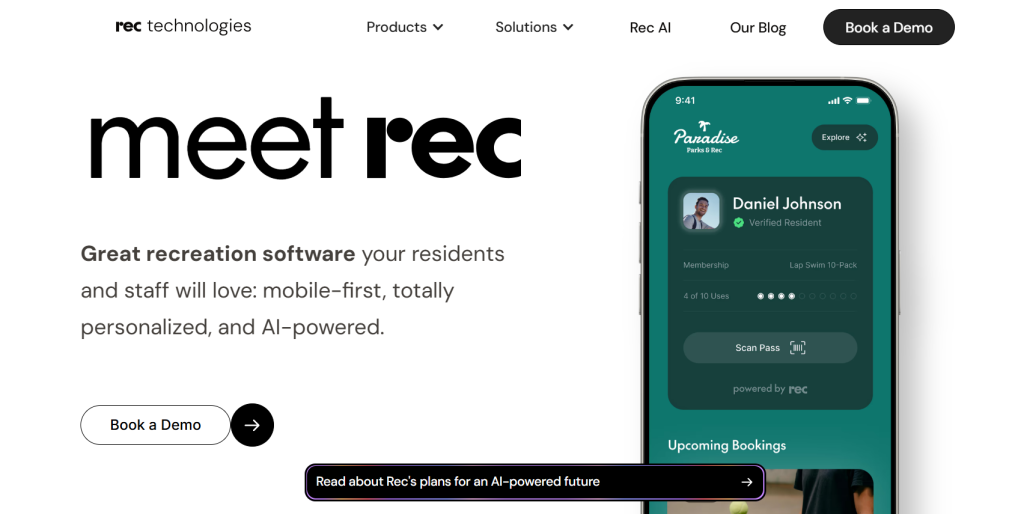Rec Technologies Raises $11M Series A to Redefine Parks & Recreation Management
September 22, 2025
byFenoms Start-Ups

Rec Technologies, a San Francisco Bay Area startup modernizing recreation management, has raised $11 million in Series A funding. The round was led by 35V and Marquee Ventures, underscoring investor confidence in the company’s mission to build the next generation of recreation technology for parks, community centers, and municipalities.
Founded by Birju Kadakia, Rec Technologies is positioning itself as the central hub for recreation departments looking to deliver a modern digital experience to residents and staff. The platform is designed to streamline operations, enhance community engagement, and create a more data-driven approach to parks and recreation management.
Why Parks & Recreation Needs a Digital Upgrade
Municipal recreation departments often face the same challenges: outdated systems, manual processes, and fragmented workflows. While cities and communities have embraced digital transformation in areas like utilities and transportation, recreation management has lagged behind.
This creates inefficiencies for staff, frustration for residents, and missed opportunities for community engagement. By raising $11M, Rec Technologies aims to close that gap - offering recreation departments cloud-based, mobile-friendly, and user-centered tools that bring the same level of convenience people expect from modern consumer apps.
The Investor Mix and Their Strategic Role
The Series A backers are telling:
- 35V (the venture firm co-founded by Kevin Durant and Rich Kleiman) brings a deep connection to sports, culture, and community engagement - aligning perfectly with recreation’s role in strengthening local communities.
- Marquee Ventures, based in Chicago, focuses on high-growth companies that connect industries to innovation, making them an ideal partner for scaling municipal and civic technology.
Together, these investors not only provide capital but also offer cultural and strategic reach - key for expanding Rec Technologies into municipalities and communities nationwide.
The Overlooked Lesson in Scaling Civic Tech
Here’s a truth that many founders miss when working with government and civic institutions: adoption cycles are slower, but stickier.
Startups often chase speed and user growth at all costs, but in civic tech, the playbook is different. The real competitive advantage comes from integration and retention, not rapid signups. Once a city adopts a system, switching costs are high, and contracts often span years.
This means the winning strategy isn’t just building a slick interface - it’s proving long-term reliability, compliance, and support at scale. Companies that invest early in robust onboarding, training, and service guarantees can lock in municipalities for the long haul.
Founders should note: in civic tech, the first 10 contracts matter more than the first 1,000 users. They define the case studies, references, and trust that unlock nationwide expansion.
Rec Technologies’ Approach
Rec Technologies is positioning itself as the all-in-one digital layer for parks and recreation leaders. Its platform aims to:
- Modernize facility booking and scheduling with intuitive, mobile-first interfaces.
- Streamline program registration for classes, leagues, and community events.
- Automate staff workflows, reducing administrative burden and errors.
- Enable data-driven decision-making, giving leaders visibility into program usage, resource allocation, and community needs.
- Enhance resident engagement by providing a simple, accessible, and digital-first experience.
By combining ease of use with operational efficiency, Rec Technologies is tackling one of the most under-innovated but high-impact areas of civic life.
Industry Outlook: The Rise of Recreation Technology
The funding round comes at a time when recreation and community engagement are increasingly recognized as core pillars of urban development. The industry outlook supports Rec Technologies’ mission:
- According to IBISWorld, the U.S. parks and recreation sector generates over $70 billion annually across services, events, and facilities.
- Digital government services adoption is expected to grow at a CAGR of 18% through 2030, reflecting municipalities’ increasing investment in digital-first solutions.
- Surveys from the National Recreation and Park Association (NRPA) reveal that 83% of Americans identify parks and recreation as essential public services, placing pressure on local governments to modernize offerings.
- In 2023, municipalities spent over $10 billion on recreation and community services technology, a figure expected to rise steadily as cities compete to attract residents and improve quality of life.
- The post-pandemic demand for outdoor spaces, fitness programs, and community engagement has surged, with usage of recreation facilities up 20% compared to pre-2020 levels.
With these trends, Rec Technologies is tapping into a market where modernization is not optional - it’s expected.
Challenges and Opportunities
While the $11M raise provides momentum, Rec Technologies will face several challenges:
- Procurement complexity: Municipal contracts involve long bidding cycles and compliance requirements.
- Integration demands: New systems must work seamlessly with legacy infrastructure.
- Change management: Staff accustomed to manual workflows may resist digital adoption.
At the same time, these challenges present opportunities. By mastering procurement navigation and user-friendly onboarding, Rec Technologies can set itself apart as the go-to vendor for civic leaders eager to modernize.
Looking Forward
For Birju Kadakia and the Rec Technologies team, the $11 million Series A is more than funding - it’s fuel for transformation. By marrying civic infrastructure with modern software, Rec Technologies is positioning itself to become the default operating system for recreation departments across the U.S.
As demand for digital civic services grows and municipalities race to deliver better experiences to residents, Rec Technologies is poised to lead the charge in building stronger, more connected communities through technology.









